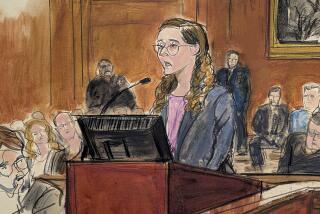Fastows Plead Guilty to Enron Charges
- Share via
HOUSTON — Andrew and Lea Fastow, the onetime Enron Corp. power couple who held this city in thrall as they wrangled the most important deal of their lives, pleaded guilty to fraud-related charges Wednesday, opening the door for an insider’s tour of the failed energy merchant’s misdeeds.
Andrew Fastow, the former finance chief who built Enron’s complicated web of off-the-books partnerships to hide debt and boost profit, accepted a possible 10-year sentence. Lea Fastow, who had been an assistant treasurer at the company, agreed to spend five months in prison.
Her husband promised to help prosecutors build a case against others at Enron, perhaps including former Chairman Kenneth L. Lay and former Chief Executive Jeffrey K. Skilling.
“I and other members of Enron senior management fraudulently manipulated Enron’s publicly reported financial results,” Fastow said in a statement to U.S. District Judge Kenneth Hoyt. Fastow didn’t identify those senior managers. Lay and Skilling have maintained they did nothing wrong.
In his plea bargain, Fastow agreed to pay nearly $30 million in restitution of profit he reaped from the off-balance-sheet partnerships, which helped grease Enron’s slide into bankruptcy in December 2001. Enron’s meltdown wiped out nearly 6,000 jobs and thousands of retirement dreams as $68 billion in market value was destroyed in a matter of weeks.
Fastow, who was charged with 98 felony counts, pleaded guilty to two: conspiracy to commit wire and securities fraud. In exchange, prosecutors said they would recommend a 10-year prison term when he is sentenced April 19 as long as he cooperated with the Justice Department’s Enron Task Force.
Under federal policies that effectively reduce sentences by about 15%, Fastow will probably spend about 8 1/2 years behind bars, according to Leslie Caldwell, who leads the Justice Department’s investigation of Enron.
With Fastow’s agreement to cooperate, Caldwell and her team of lawyers will gain access to the inner workings of Enron’s highest-ranking executives, and many in Houston are hoping that leads to the indictments of Skilling and Lay.
“For the first time, the Enron Task Force now has a seat on the 50th floor of Enron, and whatever Andrew Fastow knows about what went on the 50th floor ... the Enron Task Force will now know as well,” Caldwell told reporters outside the courtroom.
Caldwell declined to comment on news reports that the deal with Fastow set the stage for charges against Skilling: “The investigation is very active, and this is a significant development, which I expect will yield results.”
Two hours after his plea, in a separate courtroom, his wife admitted guilt in filing a false tax return. Neither showed much emotion during their hearings, although Lea Fastow managed to smile and wave to relatives and friends.
When asked if they were on any prescription drugs that might influence their ability to enter a valid plea, both Andrew and Lea Fastow said that they were taking prescription anti-anxiety medication but that it did not affect their judgment.
For Lea Fastow, prosecutors said they would recommend that she serve five months in a penitentiary when she is sentenced April 7, to be followed by five months under house confinement and then one year of supervised release.
U.S. District Judge David Hittner refused to dismiss the remaining five felony charges against her until he had decided on whether to accept her plea and the recommended sentencing. If the judge imposes a harsher sentence, Lea Fastow could withdraw her guilty plea and proceed to trial, during which she would face six felony counts, one of which carries a maximum sentence of 20 years.
According to statements in court, Lea Fastow filed a false tax return involving $141,000 in income over four years, from 1997 to 2000, from one of the illegal Enron partnerships.
Mike Ramsey, Lay’s attorney, called the Fastow pleas “tragic” for their family but reasserted that the developments in the government’s prosecution delivered no stinging punch to his client. Skilling’s attorney, Bruce Hiler, did not return phone calls Wednesday to his Washington office.
Fastow’s 10-year sentence is steep for a white-collar crime, but the wave of corporate scandals that began with Enron has raised the likelihood that jurors will throw the book at corporate felons, said Henry Pontell, a UC Irvine criminology professor and coauthor of “Profit Without Honor: White-Collar Crime and the Looting of America.”
“Nobody wants to get in front of a jury,” Pontell said. “It says something about how society has changed .... The question is, are the prosecutors going to be able to get enough from him to bring Lay and Skilling to trial?”
Several others have been charged or pleaded guilty to fraud and other crimes related to Enron’s business activities.
Fastow is not expected to play a role in the investigation of manipulation of California’s energy markets, which has brought guilty pleas from two top Enron traders, said Matthew J. Jacobs, assistant U.S. attorney in San Francisco. A third trader is scheduled for trial in October.
Houston has paid rapt attention to the Enron saga since the 1990s, when Enron and the people who worked there were applauded and envied for what appeared to be their fabulous success in building the country’s seventh-largest company.
Chris Alexander, a 54-year-old coffee bar employee, likened the Enron trial to pre-Oscars buzz in Hollywood.
“L.A. has show business. Houston has oil and energy,” he said, “and that’s what the gossip is about.”
Calvo reported from Houston and Times staff writer Rivera Brooks reported from Los Angeles.
More to Read
Inside the business of entertainment
The Wide Shot brings you news, analysis and insights on everything from streaming wars to production — and what it all means for the future.
You may occasionally receive promotional content from the Los Angeles Times.










